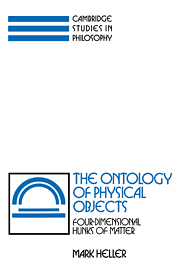4 - Appropriateness and paraphrase
Published online by Cambridge University Press: 05 June 2012
Summary
TO PARAPHRASE OR NOT?
I have argued that the standard ontology is false and should be replaced by the hunk ontology. Of the four alternative ways to handle vagueness, three of them were unacceptable. However, the alternative that I end up accepting is likely to seem far more extreme than the three that I rejected. My goal in this chapter is to eliminate some of the feeling of extremism associated with the rejection of the standard ontology. One approach, common in contemporary philosophy, would be to present a paraphrase. In this case I would not have to reject the standard ontology so much as redescribe it. The goal would be to interpret our everyday utterances in a way that commits their users only to the objects of the true ontology. If done correctly, those everyday sentences that seem to be true will in fact be true once they are paraphrased, and those that seem to be false will in fact be false once they are paraphrased.
There are some questions as to what follows from our ability or inability to produce an adequate paraphrase. If the paraphrase project can be completed, does that show that we have been talking about hunks all along, or does it only show that our old false nonhunk talk can be replaced by our new true hunk talk? If the latter, why is this valuable? Is it because it presents a means for getting us to start saying true things, or because it provides an explanation of why it is not so bad for us to keep saying false things?
- Type
- Chapter
- Information
- The Ontology of Physical ObjectsFour-Dimensional Hunks of Matter, pp. 110 - 160Publisher: Cambridge University PressPrint publication year: 1990

